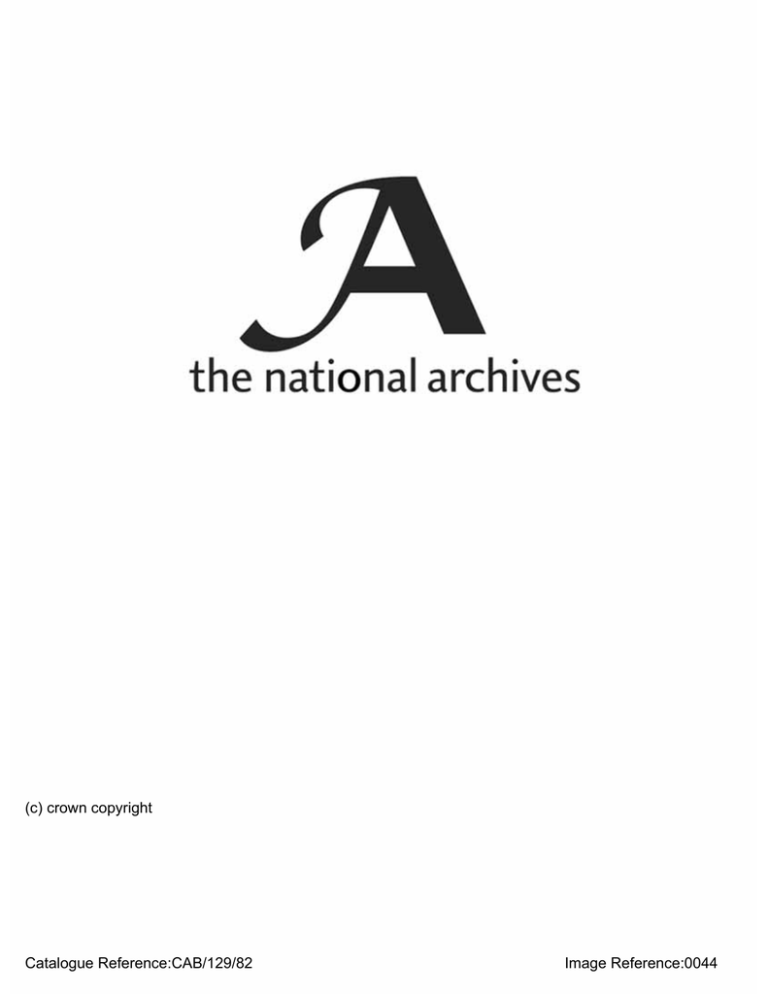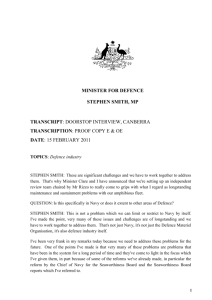(c) crown copyright Catalogue Reference:CAB/129/82 Image Reference:0044
advertisement

(c) crown copyright Catalogue Reference:CAB/129/82 Image Reference:0044 SECRET C . P . (56) 194 COPY NO. J ' 28th July, 1956 CABINET O P E N - C A S T MINING Memorandum by the Chancellor of the Exchequer On 31st January, 1956, the Cabinet appointed a Committee of Ministers under m y Chairmanship to formulate and apply a revised policy for open-cast mining and to report from time to time ( C . M . (56) 8th Conclusions, Minute 9). 2. We have received reports f r o m officials on:­ (i) the production programme for the next ten y e a r s ; (ii) procedures and compensation provisions. Production P r o g r a m m e 3. The o f f i c i a l s ' report set out the opposed views of the Minister of Agriculture and the Secretary of State for Scotland, on the one hand; and of the Minister of Fuel and P o w e r , on the other, with regard to the use of agricultural land for open-cast coal production. There are three possible courses:­ (a) The suggestion of the Minister of Agriculture, v i z . , that the sites now " f r o z e n " for agricultural reasons should remain frozen; but that a limited number of other f i r s t - c l a s s agricultural sites should be selected for exemption until the end of 1958 on a basis that had regard to coal supply as well as agricultural considerations. The Secretary of State for Scotland wants to continue the ban on open-cast coal working and prospecting on first-class and near-first class land in East Lothian, together with a general ban on working on all other land which the Department of Agriculture f o r Scotland consider to be first c l a s s . Adoption of these policies would give a total output f o r 1957 and 1958 of about 23j million tons. (b) The Minister of Fuel and P o w e r considers that in the present coal situation, having regard to our balance of payments, open-cast production should not be limited to twelve million tons a year. He would, therefore, wish to bring the sites frozen for agricultural reasons into the production programme after the end of this y e a r , since the next two years will be crucial. If his proposal i s adopted, it would give an output of 25. 6 million tons in 1957 and 1958 and an average of 12.6 million tons a year over the whole period 1957 to 1965. (c) The Official Committee have put forward a middle course. This is that in future there should be no general ban on open-cast working without prejudice to individual cases, where v e r y strong agricultural or amenity objections may exist; and that sites now frozen should remain frozen, except for three in East Lothian which are not of the same very high agricultural quality as the other exempted sites and which are assumed to contain about one million tons of coal. The frozen sites would be reconsidered in the event of output being lost if it was decided to change over from Defence Regulations to semi-permanent legislation. This compromise course is acceptable to the Minister of Agriculture, but the Secretary of State for Scotland r e s e r v e s his position as regards East Lothian. The Minister of F u e l and Power, however, for the reasons given above, wishes to modify the compromise proposal to obtain greater production in the two ensuing years. 4. Increased production in 1957 and 1958 can, however, only be obtained by releasing sites which have so far been exempt on various grounds. We have reviewed these and their continued exemption is being examined again by the Ministers concerned. We have agreed, however, that, with regard to sites frozen on amenity grounds, undertakings already given preclude any working at Wentworth Woodhouse in Yorkshire and at Delhi Extension in Northumberland, but that the adjacent site at Blyth River in Northumberland may be brought into production at the end of 1957 when the present undertaking e x p i r e s . Further consideration on their merits i s also being given to eight separate sites in Yorkshire - mainly woodland ­ which have been preserved on amenity grounds and whose working would arouse considerable opposition from the local authorities. The extra coal which could be obtained if the sites mentioned were permitted to be worked is calculated to be as f o l l o w s : Blyth R i v e r : 1.2 million tons (of which only 200, 000 tons would be obtained by the end of 1958). 435, 000 tons (the Minister of Housing and Seven sites in Yorkshire: Local Government and the Minister of Fuel and Power have agreed that the eighth site should not be touched, and that the other seven should be examined: possibly 200, 000 tons might be obtained by this process). 5. F r e s h examination is also being given to the exempted agricultural sites with a view to making available f o r working any which do not clearly fall within the category of first-class land, but we are not yet able to g i v e an estimate of the possible additional y i e l d . Subject to these reviews we recommend that the modified compromise course be adopted, the Secretary of State for Scotland reserving his position on the three sites in East Lothian. 6. E v e r since open-cast operations began, the need for coal has been so urgent that work has followed hard on prospecting and much of this has been on good agricultural land. If m o r e of this land is to be saved f r o m open-cast working, it is essential to build up a r e s e r v e of sites where coal has been proved in order that a choice can be made where land of different agricultural qualities is involved. The National Coal Board cannot speed up prospecting to the extent required without a considerable increase in their technical staff; they will, in fact, need to increase their staff in order to maintain the present rate of production. If they are to recruit and retain staff, they need to be able to offer them security of employment over a number of years, and this will be greatly helped by a Government announcement that as far as can be foreseen open-cast production will continue at a high level for at least ten y e a r s . We t h e r e ­ f o r e ask our colleagues to authorise the Minister of Fuel and Power to make such a statement. 7. The report of officials was prepared on the basis that Defence Regula­ lions could not last indefinitely and that, therefore, within the next few years, they must be succeeded by some m o r e permanent form of legislation which would conform to normal peacetime requirements, including the lodging of appeals by affected parties and the holding of public enquiries or hearings. 8. W e recognise that if it is decided that Defence Regulations relating to land must be abolished within the next few y e a r s , a new Bill w i l l be required to enable the National Coal Board to obtain land for open-cast mining. Nevertheless, we are impressed by the difficulties of legislation on this subject, apart from the difficulty of fitting such a Bill into the legislative time-table. In debate, the whole open-cast programme might be called into question, and even if there were an overlap in the coming into operation of the new B i l l before the expiry of Defence Regulations ­ which in itself would give r i s e to awkward anomalies - there would be an inevitable loss of production while the new and slower procedures took effect. - It has been estimated that this "once for a l l " loss might be as high as 2 million tons. 9. W e recommend, therefore, that the existing procedure under Defence Regulations, which has worked for fourteen y e a r s , should be maintained as long as possible. We recognise that it is capable of i m p r o v e ­ ment, m o r e particularly since the Regulations w e r e drafted in a w a r - t i m e context. Certain improvements, including better compensation, w e r e recommended by officials and will make the procedure m o r e acceptable. The greatest need for improvement is in compensation; we recommend that this should be much m o r e generous, and officials are working out details of a modified scheme. An improved scale of compensation might go some way towards lessening the objections by owners and occupiers to requisitioning. 10. Increased compensation to owners and occupiers does nothing to mollify other objectors, such as planning authorities, and the normal opportunities for appeals and public enquiries will still not be available. Nevertheless, we think that for the reasons already given the disadvantages are outweighed by the merits of the present system. Summary 11. We accordingly invite the Cabinet to agree ­ (1) that the compromise production programme outlined in pai*agraphs 3(c), 4 and 5 should be adopted, the Secretary of State for Scotland reserving his position on the proposal to bring three sites in East Lothian into production; (2) that the Minister of Fuel and Power should announce on a suitable occasion that open-cast production is expected to continue at a high l e v e l for at least ten y e a r s ; (3) that m o r e generous compensation should be paid both to landlords and tenants; 7. The report of officials was prepared on the basis that Defence Regula­ tions could not last indefinitely and that, therefore, within the next few years, they must be succeeded by some m o r e permanent form of legislation which would conform to normal peacetime requirements, including the lodging of appeals by affected parties and the holding of public enquiries or hearings. 8. We recognise that if it is decided that Defence Regulations relating to land must be abolished within the next few years, a new B i l l will be required to enable the National Coal Board to obtain land for open-cast mining. Nevertheless, we are impressed by the difficulties of legislation on this subject, apart f r o m the difficulty of fitting such a Bill into the legislative time-table. In debate, the whole open-cast programme might be called into question, and even if there w e r e an overlap in the coming into operation of the new Bill before the expiry of Defence Regulations ­ which in itself would give rise to awkward anomalies - there would be an inevitable loss of production while the new and slower procedures took effect. It has been estimated that this "once for a l l " loss might be as high as 2 million tons. 9. We recommend, therefore, that the existing procedure under Defence Regulations, which has worked for fourteen years, should be maintained as long as possible. We recognise that it is capable of i m p r o v e ­ ment, m o r e particularly since the Regulations were drafted in a w a r - t i m e context. Certain improvements, including better compensation, w e r e recommended by officials and w i l l make the procedure more acceptable. The greatest need for improvement is in compensation; we recommend that this should be much m o r e generous, and officials are working out details of a modified scheme. An improved scale of compensation might go some way towards lessening the objections by owners and occupiers to requisitioning. 10. Increased compensation to owners and occupiers does nothing to mollify other objectors, such as planning authorities, and the normal opportunities for appeals and public enquiries w i l l still not be available. Nevertheless, we think that for the reasons already given the disadvantages are outweighed by the merits of the present system. Summary 11. We accordingly invite the Cabinet to agree ­ ( 1 ) that the compromise production programme outlined in paragraphs 3 ( c ) , 4 and 5 should be adopted, the Secretary of State for Scotland reserving his position on the proposal to bring three sites in East Lothian into production; ( 2 ) that the Minister of Fuel and Power should announce on a suitable occasion that open-cast production is expected to continue at a high level for at least ten y e a r s ; ( 3 ) that m o r e generous compensation should be paid both to landlords and tenants; (4) that no fresh legislation should be introduced in the near future, subject to any over-riding decision to abolish Defence Regulations relating to land. H.M. Treasury Chambers, S . W . 1 . 27th July, 1956.




